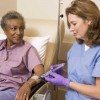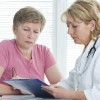 Neoadjuvant, or preoperative, chemotherapy is the use of chemotherapy to treat breast cancer before surgery. If your doctors have suggested that you consider this treatment, you probably have questions about it. This 4-page fact sheet provides an overview of chemotherapy treatment, potential side effects, and major benefits. Written by Barbara F. Shea and Martha C. Monroe, and published by the UF Department of Family Youth and Community Sciences, April 2015. (Photo: iStock/Thinkstock.com)
Neoadjuvant, or preoperative, chemotherapy is the use of chemotherapy to treat breast cancer before surgery. If your doctors have suggested that you consider this treatment, you probably have questions about it. This 4-page fact sheet provides an overview of chemotherapy treatment, potential side effects, and major benefits. Written by Barbara F. Shea and Martha C. Monroe, and published by the UF Department of Family Youth and Community Sciences, April 2015. (Photo: iStock/Thinkstock.com)
http://edis.ifas.ufl.edu/fy897
Tag: B.F. Shea
Breast Cancer: Making Sense of the Numbers
 A breast cancer diagnosis is always a challenge to the patient and her family.* People react in different ways to a breast cancer diagnosis. Some breast cancer patients want to take an active role in understanding and choosing their treatment, and others prefer to leave decisions to their health care providers. This 5-page fact sheet, first in a 12-part series on breast cancer, provides information that will help persons who want to understand and be actively involved in treatment decisions. Was written by Martha C. Monroe, Barbara F. Shea, and Linda Bobroff, and published by the UF Department of Family Youth and Community Sciences, December 2014. (Photo: iStock/Thinkstock)
A breast cancer diagnosis is always a challenge to the patient and her family.* People react in different ways to a breast cancer diagnosis. Some breast cancer patients want to take an active role in understanding and choosing their treatment, and others prefer to leave decisions to their health care providers. This 5-page fact sheet, first in a 12-part series on breast cancer, provides information that will help persons who want to understand and be actively involved in treatment decisions. Was written by Martha C. Monroe, Barbara F. Shea, and Linda Bobroff, and published by the UF Department of Family Youth and Community Sciences, December 2014. (Photo: iStock/Thinkstock)
http://edis.ifas.ufl.edu/fy895
Breast Cancer: Coping with Hair Loss (FCS8833/FY903)
 There are so many things to pay attention to when faced with cancer and chemotherapy that many women may not take the time to look at the bright side of losing their hair. In an attempt to help ease this transition and make light of this inevitable change, this fact sheet has a list of advantages of not having hair. Perhaps you’ll be able to add to this list. Written by Martha Monroe and Barbara Shea, and published by the UF Department of Family Youth and Community Sciences, January 2012.
There are so many things to pay attention to when faced with cancer and chemotherapy that many women may not take the time to look at the bright side of losing their hair. In an attempt to help ease this transition and make light of this inevitable change, this fact sheet has a list of advantages of not having hair. Perhaps you’ll be able to add to this list. Written by Martha Monroe and Barbara Shea, and published by the UF Department of Family Youth and Community Sciences, January 2012.
http://edis.ifas.ufl.edu/fy903
FCS8835/FY905 Breast Cancer: Learning about Radiation Therapy
FCS8835, a 3-page fact sheet by Martha C. Monroe and Barbara F. Shea, provides a basic orientation to external radiation therapy for the treatment of breast cancer. Published by the UF Department of Family Youth and Community Sciences, February 2010.
http://edis.ifas.ufl.edu/fy905
FCS8832/FY902 Breast Cancer: Getting through Chemotherapy…Tips from Survivors
FCS8832, a 3-page fact sheet by Martha C. Monroe and Barbara F. Shea, offers some tips from the Gainesville Breast Cancer Support Group to help cancer patients get through chemotherapy treatments. Published by the UF Department of Family Youth and Community Sciences, February 2010.
http://edis.ifas.ufl.edu/fy902
FCS8831/FY901 Living without Lymph Nodes
FCS-8831, a 4-page fact sheet by M.C. Monroe, K. Roberts, and B.F. Shea, helps women understand why lymph nodes are important, why sometimes it is necessary to sacrifice them, and recommends measures women can take to prevent or minimize infection and lymphedema after surgery for breast cancer. Includes references. Published by the UF Department of Family Youth and Community Sciences, March 2009.
http://edis.ifas.ufl.edu/FY901